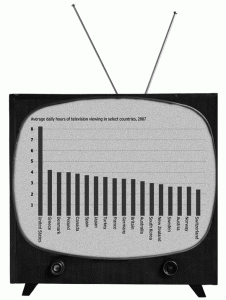Babies and TV
In an article on the TLC website titled, “Is it OK for Babies to Watch TV?” contributing writer Jacob Silverman discusses the negative effects that TV watching has on babies. In the article Silverman addresses several studies which found positive correlations between time spent watching TV and difficulty reading. From these studies, many psychologists and educators have recommended that parents limit their children’s TV consumption. But what about TV programs that claim to be educational for children? Silverman says that studies have been released that show programs like “Baby Einstein” may actually hinder child development. While these programs are very popular, they mostly contain rapidly moving images to attract babies’ attention, rather than active dialogue. Parents think that because shows like “Baby Einstein” are supposed to be educational, it makes it more okay for them to use the TV as a kind of babysitter while they are doing chores around the house and can’t devote their full attention to their baby. This poses a problem because of the sensitivity of babies’ brain development before the age of 2. During this time babies are forming important neural connections and the best way to do this is by providing interactive stimulation, which most programs claiming to be educational fail to do. In one study published in the Journal of Pediatrics, vocabulary development of babies 8-16 months old was studied as a function of watching programs like “Baby Einstein.” It was found that for every hour a day that a child watched these programs, they knew six to eight fewer words compared to children of the same age who did not watch them. Studies suggest that the best way to encourage proper brain development among children is to have parents interact with them and if parents do allow babies to watch TV than it is best to watch with them and provide explanations for the content.
Silverman’s critique of “educational” programing is relatable to the veldt in Ray Bradbury’s story “The Veldt” because the parents in “The Veldt” thought that by providing their children with this new technology they were helping to entertain them and enhance their lives, when in reality the veldt was detrimental to their well being and inhibited interaction between them and their parents. While programs like “Baby Einstein” are not as crazy as the veldt, they do make parents think they have the benefit of educating children while keeping them busy. Overall it seems the most important way to influence children’s well being is by providing them with personal interactions. Also “The Veldt” and Silverman’s article show that it is important to know the real costs and benefits of programs that may be sold as beneficial to children but in reality are not.





